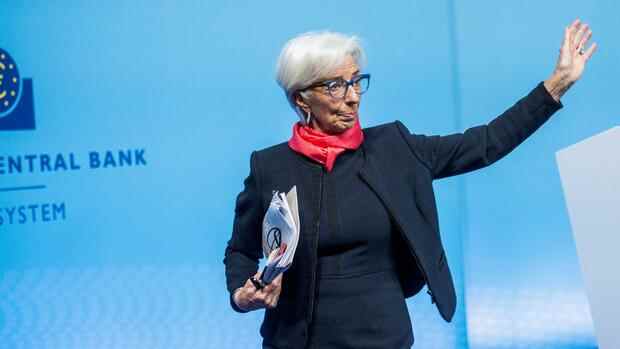Only a few ECB members did not agree with the package.
(Photo: Reuters)
Frankfurt The European Central Bank (ECB) wants to tighten its monetary policy, but to proceed much more slowly than other central banks. ECB President Christine Lagarde emphasized on Thursday that the decisions on this were made by a “very, very large majority”. Only “a few members of the Council” had “disagreed with one or the other aspect of the package”.
The discrepancies are mainly about two points, as the Handelsblatt learned from two insiders from central bank circles: Discrepancies about whether the inflation target has been reached, and the great flexibility that the ECB reserves in its bond purchases in the future.
The central bank is aiming for a price increase of two percent for the entire euro area. It is crucial that it meets this goal in the medium term. According to the new forecasts of the ECB, inflation is expected to rise to 3.2 percent next year and 1.8 percent each in 2023 and 2024.
Bundesbank President Jens Weidmann and his counterpart from Belgium Pierre Wunsch, from Austria Robert Holzmann, from France François Villeroy de Galhau and ECB Director Isabel Schnabel are of the opinion, according to Handelsblatt information, that the inflation target would be achieved. The question is relevant when it comes to how long the ECB is setting monetary policy for.
Top jobs of the day
Find the best jobs now and
be notified by email.
According to Thursday’s decision, the PEPP pandemic purchase program is due to expire in March. At the same time, the central bank plans to increase the older APP bond purchase program to EUR 40 billion a month from April and reduce this volume to EUR 30 billion from July and to EUR 20 billion from October.
Interest rate hike in 2022 is de facto excluded
Since a prerequisite for an interest rate increase is that the bond purchases are terminated beforehand, rising interest rates in the next year are in fact excluded. Weidmann, Holzmann, Schnabel & Co. would have preferred not to commit so long.
In their view, there are also clear risks that inflation could turn out to be higher than currently expected. For example, the ECB takes into account the oil prices on the futures market in its forecasts for the coming years. These indicate a decline in prices. However, it is uncertain whether oil prices will really fall.
In addition, wages could be higher than initially expected. In addition, the ECB wants to take into account the prices for owner-occupied residential property in the inflation calculation. It did not do that in the forecasts, but it would probably increase inflation by 0.2 to 0.3 percentage points.
Bundesbank President Jens Weidmann also sees a second point as critical. This is about the great flexibility that the ECB will reserve in future when it comes to its bond purchases. According to Thursday’s decision, under stress conditions, “flexibility within the mandate will remain a component of monetary policy in the future, whenever the achievement of price stability” is threatened.
In its statement, the ECB explicitly mentions the PEPP program, with which it retains the option of flexibly adjusting reinvestments. The wording not only refers to this, but does not exclude this possibility for other bond purchase programs either.
The ECB is making it relatively clear that it will intervene in the markets if the yield spreads between the euro countries exceed certain levels that it considers critical. The ECB did not want to comment on the information when requested.
More: Will inflation stay high? These eight graphics show the arguments for and against

